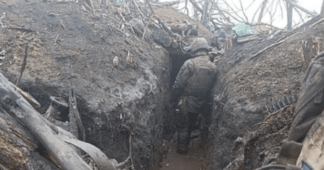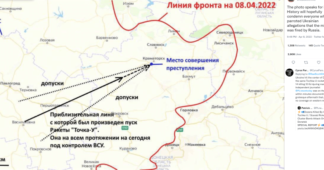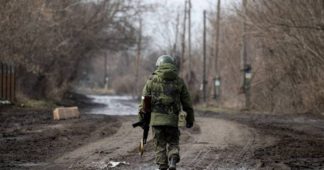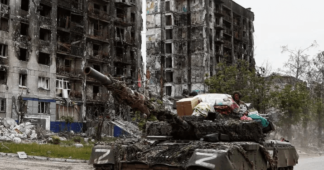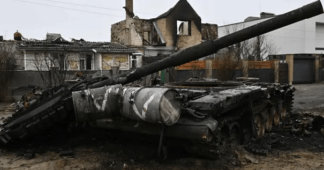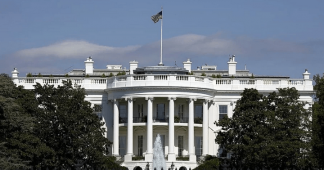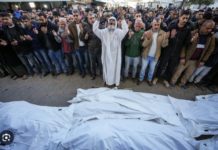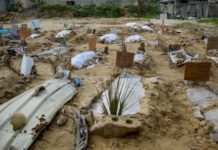By Dmitri Kovalevich
exclusive monthly report to New Cold War. Dmitri Kovalevich is a special correspondent in Ukraine for the Newcoldwar website.
This is his report covering the month of April 2023
May 8, 2023
The end of April marks the end of the 14th month of the Russian military operation in Ukraine. The fiercest fighting continues in and around the small city of Bakhmut (named Artemovsk in Russia), from which the Armed Forces of Ukraine (AFU) are gradually being pushed. The Ukrainian armed forces still control some ten per cent of the territory on the western outskirts of the city. In order to support these forces, more and more units are being thrown into the battle and many of its soldiers are losing their lives.
The military situation in and around Bakhmut (named Artemovsk in Russia)
Even getting to Bakhmut is extremely difficult for the Ukrainian reinforcements because the Russian side has cut off all roads leading to the town. Bakhmut has effectively become a trap in which hundreds of conscripted Ukrainians are dying daily.
In a recent interview, Vladimir Zelensky said that Ukrainian troops would not leave Bakhmut because the loss of it would open the road to the larger cities of Slavyansk and Kramatorsk. These cities are located some 40 km and 50 km northwest of Bakhmut, respectively. Both of these major cities in the Donbass region were epicenters of the 2014 uprising against the violent, extreme-right coup in Kyiv in February of that year. Most of the population remaining in these two cities is loyal to Russia and the Donbass republics of Lugansk and Donetsk (now officially members of the Russian Federation). The battalions of Ukrainian nationalists concentrated in Slavyansk and Kramatorsk do not allow any political expression of either sympathy or antipathy.
In mid-April, Mikhail Choknady, an AFU soldier from Transcarpathia in western Ukraine who is currently fighting around Bakhmut, published a video on his Facebook page. He said that the new recruits being sent to his unit, were not properly trained. Many of them had not even been trained to shoot, he said. “They’ve never fired a shot in their lives. They haven’t had any training at all. They were stationed somewhere in the Sumy region (northern Ukraine) for five days and then sent here, to fight in the Bakhmut direction. They were given machine guns, but they don’t even know how to load the magazines,” another Ukrainian soldier explained on the Telegram messaging service.
In another video broadcast at the end of April from Kiev, a Ukrainian soldier of the 101st Brigade of Territorial Defense of the AFU said the command of the AFU is sending soldiers to their deaths while prohibiting the removal of their bodies, thus effectively stealing their salaries, bonuses and allowances. “The commanders send them to their deaths! Our guys are dying for nothing!” the soldier says.
Forced military conscription in Ukraine continues
Forced military conscription in Ukraine continues unabated. In late April, a Ukrainian military medic who was transporting the body of a dead soldier, said that medical commissions at military enlistment offices send anyone to the army, even those with health problems. “This soldier died in his sleep. He was 37 years old; went to sleep and didn’t wake up,” the front-line medic said, pointing to the soldier’s body in his car.
According to estimates of the Ukrainian Military Media Center channel, which is run by the Main Intelligence Directorate of the Ukrainian Defense Ministry, there are 370,000 Russian soldiers now fighting against Ukrainian forces.
Ukraine’s Ambassador Vadym Prystaiko told the British tabloid Daily Express in early April that Ukraine had drafted a million men into military service. But the Ukrainian government’s policy is to prohibit any discussion of losses. “When the war is over, we will acknowledge our losses. I think it will be a horrible number,” he said.
If we add the figure of one million to the number of those who were already serving in the Ukrainian army as of February 2022, it turns out that the Ukrainian army that is in retreat from Russian forces today is three or four times smaller than it was, despite all the supplies of Western arms.
Terrorist tactics being prepared by Ukraine?
Under such conditions, the Ukrainian army may begin to use terrorist attack tactics akin to those used by radical Islamist groups. In April, the commander of the neo-Nazi Azov Brigade, Bohdan Krotevych, said that the plan is to seize small Russian cities as part of an effort to reclaim territories lost by the Zelensky government, as The Washington Post reported on April 26. “Asked about the coming offensive, Krotevych cited the First Russian-Chechen War in 1994-96, when Chechen forces adopted a strategy of capturing small Russian towns to use as leverage to recover Russian-held areas. He suggested Ukraine may do the same.”
The Post report chose not to tell its readers that, in fact, the “capturing of small Russian towns” during the First Chechen War were terrorist acts, which included taking hostages from among the civilian population of the towns under attack and killing of some of them. Of particular note was the taking of some 2,000 hostages in the hospital in the town of Budyonnovsk in June 1995 by a group of terrorists let by notorious leader Shamil Basayev (Wikipedia). This group was responsible for nearly 200 civilian deaths.
Such tactics cannot achieve military goals, but the very essence of the conflict is to weaken Russia, even if the results are suicidal. This is the strategy pushed on the Kyiv regime by the Western powers since 2014.
Poisoned ‘depleted uranium’ ammunition being supplied to Ukraine by the West
At the end of April, close to the anniversary date of the 1986 nuclear power plant disaster in Chernobyl, the United Kingdom announced it would begin to deliver depleted uranium ammunition to Ukraine, for use in the ‘Challenger’ tanks which Britain had already committed to supply to the Kyiv regime. Britain does not monitor the use of the ammunition and is under no obligation to deal with the consequences of its use once the conflict ends. The Ukrainian Telegram channel ‘ZeRada’ writes.
“Everyone who writes today about the legacy of the disaster in Chernobyl, while remaining silent about Britain supplying depleted uranium, is a hypocrite. Hundreds of mini-Chernobyls are quietly arriving on our land because of such silence. No one in the Western media is reporting this and no one is speaking out against it.”
The writer continues, “Everyone knows the terrible statistics in Yugoslavia. Anyone could have read the warnings issued by the Serbian Health Minister at the time, but no one spoke out against it.”
Depleted uranium shells were widely used in the NATO strikes against Yugoslavia in 1999. According to medical researchers in Serbia today, the consequences include cancers, infertility and abnormalities in children born after the bombings.
Such munitions were also used during the invasion of Iraq in 2003, during the U.S, operation ‘Desert Storm’. More than 700,000 shells containing radioactive, depleted uranium were fired at ground targets. As a result residents of the Iraqi city of Fallujah, where some of the fiercest fighting between U.S. forces and popular, Iraqi forces took place, have the highest level of birth defects in the world.
Russian President Vladimir Putin warned Ukraine back in March about the consequences of the use of such munitions. In an interview with Pavel Zarubin on the Rossiya 24 television channel, Putin noted that those who use those munitions should understand that what remains afterwards will contaminate crops. He said, “In this sense we can classify depleted uranium as a weapon most harmful and dangerous to humans, not only for the combatants but also for the environment and for the people who live on this territory.”
Putin explained that the use of ‘DU’ shells on Ukraine’s fields will affect many of the country’s crops, most of which are exported to the European Union. In social media networks, some Ukrainians and Russians have recently suggested that pieces of the shells should be placed in front of the UK embassies: after all, the British government and military consider them to be safe. Some Ukrainians even tried to launch a petition on President Zelensky’s website demanding the prohibition use of Ukrainian soil of DU weapons. But the attempt was blocked.
Some Ukrainians abroad speak out against NATO’s war course
In early April, realizing that many Ukrainians are being driven to the slaughter, some Ukrainian political migrants and refugees held an online All-Ukrainian People’s Veche (an old-Slavic term for a popular assembly). The assembly discussed and approved a ‘Declaration of Protection of the Ukrainian People’. It is published on the website Narodgov.org (‘Truth Ukraine’). (The website has an English translation; the Ukrainian language version is here). Ukrainian citizens can vote from anywhere in the world using their passport as proof of citizenship of Ukraine. It terms their vision of Ukraine as “multinational”.
The declaration has been signed by dissenting Ukrainians, including journalists who have fled to Russia for their own safety. It is steeped in the anti-fascist tradition of Soviet Ukraine. It envisions the delegitimization of Zelensky and his regime and calls for the renunciation of debts accumulated by Ukrainian governments to the IMF, the European Union and the U.S. since 2014. As of this writing in late April 2023, more than five million Ukrainians have voted online. Online voting is to continue until June 1.
The declaration’s preamble reads: “We, the multinational people of Ukraine, proceed from the fact that all people are equal and endowed with inalienable rights. Among such rights are the right to life, liberty, security of person, happiness, and others. States and governments are created by human beings to secure these rights. If any form of government becomes detrimental to these rights, the people are within their rights to change it, or to abolish it altogether and establish new forms of government.”
The authors of the declaration suggest re-founding the Ukrainian state on a new basis, namely, a on the basis of social justice. This implies writing off all the debts accumulated during the time of illegitimate government (since 2014), and incurred on behalf of both Ukrainian citizens and the country’s institutions.
Orthodox Church of Ukraine targeted
In April, attacks continued in Ukraine against the Orthodox Church of Ukraine, which is accused of having close links with the Russian Orthodox Church, even though it is formally an independent organization.
Following this, an MP from Zelensky’s party, Nikita Poturaev, proposed banning all religious organizations that in one way or another have numerous adherents in Russia. This would apply to Buddhists, Muslims, and the shamanistic cults of the indigenous peoples of Siberia and the Arctic. Nikita Poturaev said that a bill to this effect was being prepared and will apply to Muslim organizations as well as to Buddhists and exotic religions as shamanism.
Earlier, the same MP, who is part of Zelensky’s ‘Servant of the People’ party, became famous for lobbying aggressively for an agricultural land market in Ukraine to privatize land and “finally bury communism” and “settle scores with Lenin and Stalin”. Subsequently, the IMF began demanding an open land market in Ukraine, in order to privatize the vast land holdings still owned and operated by the Ukrainian state or cooperative associations.
IMF lending to Ukraine continues during wartime
In April, the IMF started a new lending program for Ukraine, even though its own rules prohibit loans to countries facing insolvency due to military operations on their soil or to unpaid past debts.
Ukrainian economist Oleksandr Pyshny from the investment company Concorde Capital calls the IMF’s interest ‘predatory’ and believes that it seeks to make money on the back of Ukraine’s hard times.
During the next four years, the International Monetary Fund says it will allocate $15.6 billion in loans to Ukraine. But of this amount, Kyiv must make $12.1 billion in payments for past debts. So, in the end, Ukraine will receive only $3.5 billion. The IMF provides money to Kyiv at 6.9% per annum.
Presently, the European Union says it will not charge any interest on its loans to Ukraine until 2027. Canada says it will only charge 1.5 per cent. Nevertheless, as a result of all the accumulated interest and past debt still owing, Ukraine will likely receive only $500 million from the IMF in new money during 2023-2027, Parashchy calculates.
Ukrainian political dissident Ruslan Kotsaba (earlier imprisoned for his calls to refuse the military draft) considers that Ukraine’s future is far from being bright. The current hostilities have exacerbated all the past and present problems in Ukrainian society. “I don’t think the European Union and the U.S. will really help Ukraine recover after it fulfills its assigned, geopolitical role of weakening Russia. All that awaits us are graves,” he told the Russian media outlet Lenta.ru in an interview in April. Since August 2022, he has resided in exile in the United States. His lawyer, Svetlana Novitskaya, has told the Ukrainian court that Kotsaba is applying to the U.S. for status as a political refugee.
The simple fact is that Ukrainian authorities are well aware that the current crisis in the Ukrainian economy will only worsen unless a peace agreement with Russia is reached. But a peace agreement inevitably means addressing the security concerns of the Russian government and its people—those in Donbass, in Crimea and throughout the country. Thus, for the officials in charge in Ukraine, remaining in power, with all the present and future enrichment this offers, means the war against Russia must not end.
We remind our readers that publication of articles on our site does not mean that we agree with what is written. Our policy is to publish anything which we consider of interest, so as to assist our readers in forming their opinions. Sometimes we even publish articles with which we totally disagree, since we believe it is important for our readers to be informed on as wide a spectrum of views as possible.
